- Home
- Hammond Innes
Medusa Page 23
Medusa Read online
Page 23
‘So what do you think they were bringing ashore?’ I asked him.
‘Dunno, mate. I thought it would be just ordinary household things, TV sets, electric cookers, glassware, jewellery, anything that was taxable. But after last night …’
‘What are you suggesting – arms?’
‘Well, it certainly ain’t drugs. The Menorquins haven’t gone for that so far and the villa people …’ He stopped abruptly as Petra slithered down to join us, the pressure lamp casting her shadow behind her, lighting up the latticework of steel tubing on which we leaned.
She was panting, her eyes wide and a little wild. ‘Some silly bugger’s been playing around with candles. They’re not cave drawings at all.’ She gulped for air. ‘But it’s not that. I thought I heard voices, the sound of an engine.’
‘Where?’ Lennie asked.
‘Beyond the garage.’ She took a deep breath, pulling herself together. ‘There’s no cave-in there, no rock fall. It’s all been cleared away.’
‘You mean you went inside the garage?’
‘No.’ She shook her head, the dust stirring in her shoulder-length hair. ‘No, it was boarded up. A jagged hole stopped up with what looked like fresh matchboarding.’
Lennie didn’t wait to hear any more. He pushed past her and started back up the slope, clawing his way up on all fours. I followed, dragging Petra after me. We were all together in a bunch as we ducked past the rope we had rigged from the cellar and came to the boarded-up hole into the garage. ‘Look at it!’ Petra held the pressure lamp up and her voice was an angry whisper as she rubbed at the blurred black outline of some four-legged animals on the roof. ‘Candle-black.’ She showed me the palm of her hand. It looked as though she had been handling a badly printed newspaper, and the head of the beast was smudged. The sort of thing a schoolboy would do, and I was fool enough to hope …’
Lennie’s hand clamped suddenly over her mouth. ‘Listen!’ He opened the valve of the pressure lamp, his torch switched off, the hiss of the gas mantle dying away and in the darkness the scrape of a door sounding muffled and a voice, very faint from beyond the boarding, instructing somebody to back right up to the door. An engine revved, more directions, then a babble of whispering voices barely audible as the engine noise died away and was suddenly cut. A tailboard slammed and somebody said, ‘Quiet! Keep everything quiet.’ There was no more talking after that, only the sound of heavy boxes or crates being loaded.
‘The cellar,’ Lennie breathed. ‘Follow me and keep hold.’
We felt our way back down the blowhole till we came to the rope again. Lennie went first, then Petra. My foot was in the first loop, ready to follow her, when the crash of breaking wood sounded hollow along the passageway. I froze, thinking for a moment they had heard us and were breaking through from the garage. Somebody swore, a muffled voice – ‘That was my fucking foot, you bastard.’ An answering voice, then the two of them arguing until somebody shouted at them to cool it. By then I was on to the second loop and reaching up to clutch hold of Lennie’s hand. As soon as I was out of the hole he unhitched the end of the rope, coiling it and slinging it over his shoulder, then he swung the torch to show us the steps leading up to the cellar door. ‘Just follow me.’ Black darkness as he switched off the torch again and we felt our way up to the room above.
Back at the garden door we waited, listening. No sound now, only the door squeaking as he pulled it gently open. The garden was in three terraces, dropping away steeply to the garage driveway. Two cars were parked there, and where the garage itself disappeared into the hillside, the protruding section was merged with the body of a truck that looked like the one we had seen parked outside the Punta Codolar villa. A figure appeared out of the garage, heading for the nearest car, then turning towards us and slowing. Finally, beside the thin pencil point of a cypress, he stood quite still, feet apart, head thrown back, staring straight at us.
Could he see us in the starlight? Could he see that the door we were peering out of was half-open? We stood there, the three of us, absolutely still, waiting. The man bent his head, both hands to his front, as though holding a weapon. Then he turned and went back to the garage. ‘Pissing.’ Lennie breathed a sigh of relief, and Petra giggled under her breath as he added, ‘It was his cock, not a gun. He was just relieving himself.’ He closed the door and led us up through the villa’s three levels, up into a large room that faced both ways.
From a circular porthole window we looked out on to the hilltop where barely twenty metres of shrubland separated us from the road. Here a low stone wall marked the limit of the property and a brick arch framed an elaborate wrought-iron gate. A gravel path flanked by stone urns planted with cacti led to the heavy cedarwood door beside us. Lennie eased the catch and pushed it gently open, leaning his head out through the gap. The stars were very bright. ‘Looks clear enough.’ His scrawny neck, the lined, leathery features, the way he cocked his eyes over the landscape – I had the sudden impression of a turkey checking that nobody was going to grab him for their Christmas dinner. My mind also registered a picture of Gareth being grabbed as he ran from the King’s Fleet towards Felixstowe Ferry.
‘Shut the door,’ I hissed.
He turned, eyeing me curiously. ‘Wot’s up? Nobody there.’
‘If it’s Evans loading that truck, he’ll have somebody hidden up this side of the villa, just in case.’
‘Okay. So we wait.’
He was just shutting the window when we saw lights approaching, and heard the sound of an engine. It was a car, moving fast, and as it passed the villa’s gate Lennie sucked in his breath. ‘Jesus Christ!’ he muttered and half leant out of the window as though to call to the driver. ‘Why the hell does he come out here now?’
‘Who?’ I had only caught a glimpse of the car, a battered estate. I hadn’t seen who was driving it.
‘Miguel,’ he said, still peering out of the window as the car slowed on the dip and turned into the villa’s driveway. ‘The poor stupid bloody bastard – to come here now, just when they’re loading up.’ The car’s lights flickered through the shrubbery, then they were gone, snuffed out by the corner of the building. The engine note died abruptly.
We listened, but there was no sound – no shouts, no outcry or altercation. Just nothing.
We felt our way across to the other side of the room, standing at the window there, looking down across the flat-topped roofs of the villa’s lower levels to the truck, the whole shadowy shape of it now visible as a sort of elongated extension of the garage. And beyond it, on the sweep of the drive, as well as the two cars they had come in, there was the estate car standing black and seemingly empty.
A hand gripped mine, Petra’s voice in my ear whispering, ‘What is it?’ Her fingers tightened convulsively, but it wasn’t fear. It was excitement. Her breath was warm on my cheek, her hair touched my ear. ‘Is it to do with what happened last night?’
I couldn’t answer that. I didn’t know. In any case, I was wondering about Miguel. Was he one of them? Was that why he was here? Or had he walked right into it, unarmed and unprepared?
‘It’s arms, isn’t it? It’s an arms cache.’ And when I still didn’t say anything, she whispered urgently, ‘If it’s arms, then we have to notify somebody, warn the authorities.’
‘Not yet – when they’ve gone …’ And I added, ‘Maybe we can follow them.’
She had moved her head slightly so that it was outlined against the window. I saw the shape of it nod against the stars, her hand still in mine, still the grip of excitement, so that I was reminded that between school and college she had done a VSO stint in the Andes, trekking alone on the borders of Chile, Peru and Bolivia looking for old Inca remains. I don’t think she knew what fear was, otherwise she would never have been able to go it alone at such high altitude with only the Quechua Indians for company. ‘What’s the time?’
Lennie glanced at the luminous dial of his diving watch. ‘Twenty after midnight.’
‘Do you
think it’s arms?’ she asked him.
‘Yes, I do.’
‘Then if they’re going to use them tonight they’ll have to get a move on.’
At that moment, as though the hoarse whisper of her voice had carried to the garage below, the dark shadow of a man came hurrying up through the garden, leaping the steps between the terraces and angling away to the right. Abreast of the upper part of the villa he put his hand to his mouth and gave a piercing whistle on two notes like the call of a bird. A figure rose out of a dark mass of shrubbery beside the road some two hundred yards away, glanced quickly round, then hurried to join the man below. The two of them went back down the terraces to the garage where half a dozen men were now heading for the parked cars. The slam of a door came to us faintly, then the truck’s engine started up. The men got into the cars, all three of them, including Miguel’s estate, and the little convoy moved off, slowly and without lights, then swung left at the driveway end and from the front of the villa we watched them pass along the road, dark shapes in silhouette against the stars heading for Punta Codolar.
‘What do we do now – get the car and follow them?’
‘Depends how good you are at driving without lights,’ I told her.
She laughed. ‘Won’t be the first time.’
Lennie had the door open and we were out into the night, slamming it behind us and running to the road. It was all downhill to where Petra had parked the Beetle and took us barely two minutes. ‘Where now?’ she asked breathlessly as she started the engine. I hesitated. There was only one road out until the crossroads junction with the main Mahon-Fornells road, unless they were heading for the ports of either Macaret or Addaia. ‘Back up the hill,’ I said. ‘It’s just possible they’ll stop at the Punta Codolar villa.’ If Evans was involved and they were operating to an exact timetable, then I thought they might be using it as a rendezvous.
She drove fast, a lot faster than I would have cared to drive in that dim light, up past the villa where they had been loading the truck, over the shoulder of the cove’s sheltering arm and out on to the bleak empty heathland beyond. There was more light here, cliffs all round us dropping to the sea which reflected the starlight, and against that milky glimmer the Punta Codolar villa stood out solitary and square like a concrete pillbox, and beside it, also outlined against the stars, was the black rectangular shape of the truck.
Petra slammed on the brakes and we rolled to a stop. ‘Where now?’
We had just passed a service road under construction and some two hundred yards away to the right there was a road roller hull-down in the heathland. I told her to back up and park beside it. Close against the road roller, our front wheels hard into the rubble of an open trench where an electricity cable was being laid, the Beetle was almost indistinguishable from the heavy mass of the roller’s iron.
For almost the first time since I’d known her Petra’s obsession with the island’s megalithic past was overlaid by more immediate concerns as we speculated about what they planned to do and when, the villa hull-down and indistinct on the heathland’s horizon. I asked her whether she had any glasses in the car. She reached over to the back seat, grabbed the bag that contained her archaeological gear, and after rummaging around in it, produced a pair of those very small, high-magnification binoculars. I rolled the window down and with some difficulty managed to focus them on the villa. The field of vision was very small. ‘I was only once involved in a political upheaval.’ Petra’s voice was low and intense as though she were afraid of being overheard. ‘I was in the Cordillera Real just north of La Paz and a ragged bunch of them passed through my camp. Defeated revolutionaries are very unpredictable. South American revolutionaries, anyway, and I had found an Inca tamba that nobody had discovered before. All very exciting, worked stone blocks jigsawed together so that they wouldn’t be toppled by earthquakes, and these exhausted men in fear of their lives flopping down in the undergrowth I’d cleared. There was a thick cloud mist, everything very damp and cold. They lit a fire, huddling round it.’
It was strange to be watching the villa through glasses. Last time I had seen it I had been breaking in by the garage window and there had been nobody there. Now it was just as dark, but the cars and the truck were clear proof that there were men inside it. They must be sitting there, waiting.
‘What is it? Can you see something?’
I shook my head. All the glasses showed me was the Moorish front with its arched colonnade, the low wall that separated it from the road and the blockhouse shape of it against the night sky with the cars tucked in against the garage and the truck left out in the road.
‘Go on, Petra.’ Lennie leaned forward, his head between us. ‘What happened? Did they mess you about?’
‘If you mean what I think you mean, the answer is no, they were too bloody tired. But they did something worse. They ate up everything I had, all my stores, then went off with my tent, even my sleeping bag. I think they’d have had the clothes off my back if I’d been a man, they were that ragged and desperate. Only their guns looked in good condition.’
I thought I saw the glow of a cigarette. It was there for a second, then Lennie knocked against me and I lost it. It had come from the last arch of the villa’s colonnaded front, and focusing on it, I thought I could just make out the darker outline of a figure standing there. I heard Petra say something about trekking more than twenty miles through snow and ice and a blazing midday sun before she managed to hitch a ride with some geologists into La Paz.
‘And what happened to the men who pillaged your camp?’ Lennie asked.
‘Oh, the Army caught up with them in the end. About a dozen of them were gunned down from a helicopter, the rest were tracked down, tortured and hanged. The usual thing. There’s no mercy in the Andes.’
‘I never experienced anything like that,’ Lennie said quietly. ‘And I’ve been around. But nothing like that.’ And he added, leaning his head further forward between us, ‘You think there’s going to be a revolution here?’
She didn’t tell him not to be ridiculous. She didn’t comment. She just sat there, not saying a word, and at that moment a bright star shot up from the sea to our right, blazing a vertical trail that burst into a blob of white so bright that even at that distance it lit up our faces. ‘Bloody hell!’ Lennie pushed his nose almost against the windscreen. ‘What is it?’
‘Pyrotechnic.’ The pop of its burst came to us faintly as I jumped out of the car, steadying my elbow on the top of it and searching with the glasses for the ship that had fired it. A second stream of sparks flew up, a second burst, but this time green. I still couldn’t pick out the shape of the vessel, so it was presumably close in below the line of the cliffs.
‘That a distress signal?’ Petra asked, but I think she knew it wasn’t, because her head was turned towards the villa. Through the glasses I saw shadows moving, followed almost immediately by the sound of a car engine starting up. Doors slammed, the cars emerging on to the road. Then the truck’s diesel roared into life and it began to move, one car in front, the other behind. The time was 01.32. Miguel’s estate stayed parked against the wall.
‘What now?’ Petra had already started the engine.
‘Go back,’ I told her. ‘Back down towards Arenal, then take the main development road and we’ll wait for them just short of where it joins the Alayor highway.’ Either they were meeting up with a ship at Macaret or else somewhere further up the long inlet that finished at the new quay just beyond Addaia.
‘I don’t get it, mate,’ Lennie muttered in my ear as Petra felt her way along the dark strip of the road without lights. ‘What do they want with a ship when their truck’s already loaded? They can’t be picking up more.’ But I was thinking about Wade then, that first visit of Gareth’s to Menorca, the questions he had asked me over that lunch. And on board Medusa, the suddenness with which we had left Malta, the way he had looked that evening when I went back down to his cabin from the bridge, his sudden decision to tell me about
Evans.
We reached the crossroads and Petra pulled in to the verge. We sat there for perhaps five minutes, but there was no sound and nothing passed. I told her to drive straight across and head for the high point above the entrance to the Addaia inlet. From there we would have a clear view of Macaret itself and the seaward entrance to the harbour. We would also be able to look southwards down the length of the inlet to the two small islands that protected the final anchorage.
When we got there we were just in time to catch a glimpse of a small vessel heading down the pale ribbon of the inlet. ‘Fishing boat by the look of it,’ Lennie muttered.
Out of the car again, I was able to fix the glasses on it. No doubt about it. The boat was the Santa Maria. I jumped back into the passenger seat and told Petra to turn the car, go back to the main road, then take the cut-off down the steep little hill to Port d’Addaia itself. ‘But go carefully,’ I warned her as she swung the Beetle round. They may have dropped somebody off to keep watch. And stop near the top so that we can check if they’re there or not.’
When we reached Addaia she tucked herself into a little parking bay where we had a clear view of the quay across pantile roofs and the steep overgrown slope of the hillside, and it wasn’t just the truck from Codolar that was waiting there. I counted no less than five trucks, all parked in line along the concrete edge of the quay and facing towards us. There were more than a dozen cars, too, and a lot of men, most of them gathered round the back of the last truck, where crates were being dumped on the quay, prised open and the weapons they contained handed out.
‘Christ! See that, mate. They got rocket-launchers. The hand-held type. What do the bastards want with them?’ Lennie had followed me out of the car and across the road. From there we had a clear view of the anchorage where I had joined Carp for the voyage to Malta. And there, as though I were seeing it all again, like on video but from a different angle, was the Santa Maria motoring in through the narrows that separated the humpbacked outline of the second island from the muddy foreshore and the huddle of fishermen’s dwellings. The boat was headed straight for the quay, and as she slowed and swung her stern to lie alongside, I saw she had a stern light showing.

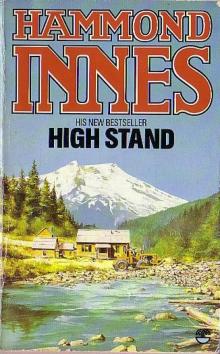 High Stand
High Stand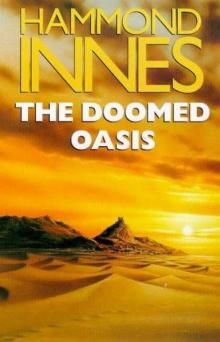 The Doomed Oasis
The Doomed Oasis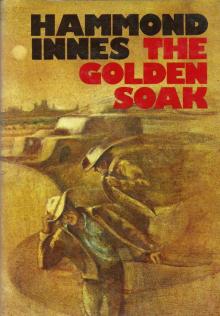 Golden Soak
Golden Soak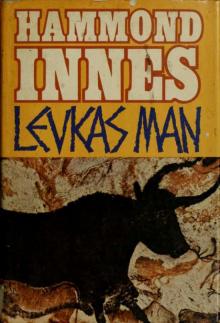 Levkas Man (Mystery)
Levkas Man (Mystery)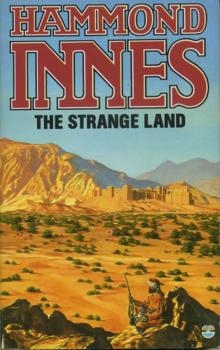 The Strange Land
The Strange Land Dead and Alive
Dead and Alive Attack Alarm
Attack Alarm The Strode Venturer
The Strode Venturer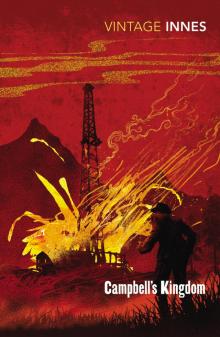 Campbell's Kingdom
Campbell's Kingdom North Star
North Star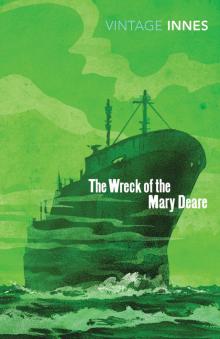 The Wreck of the Mary Deare
The Wreck of the Mary Deare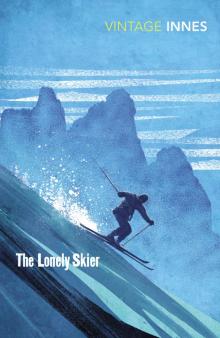 The Lonely Skier
The Lonely Skier The Black Tide
The Black Tide The Trojan Horse
The Trojan Horse Medusa
Medusa Air Bridge
Air Bridge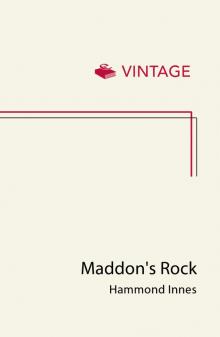 Maddon's Rock
Maddon's Rock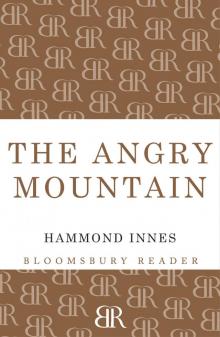 The Angry Mountain
The Angry Mountain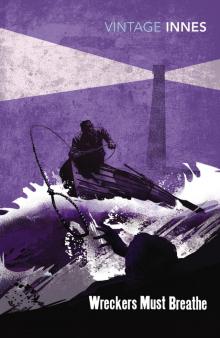 Wreckers Must Breathe
Wreckers Must Breathe Solomons Seal
Solomons Seal The White South
The White South